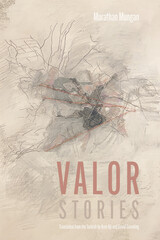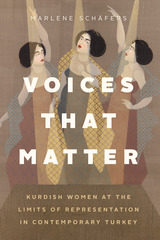4 start with V start with V

Among Murathan Mungan’s signature works, Cenk Hikâyeleri (Valor: Stories) has long been considered a milestone of twentieth-century Turkish literature. The six short stories in the collection reflect the author’s multiethnic background (which includes Kurdish, Arab, and Turkish heritage) and represent his lush poetics, literary breadth, and sociopolitical commitments.
Valor reimagines Shahmaran, a mythical half‑human, half‑snake figure that commonly appears in the folklore of Turkey’s southeastern provinces. Legend interweaves with the contemporary realities of ethnicity, religious dogma, gender, and sexuality. Uncovering hidden narratives within a rich and complicated culture, Mungan’s stories depict self-realization and sexual awakening as they showcase one of Turkey’s most popular literary voices.


Cappadocia, a picturesque volcanic region of central Anatolia, preserves the best evidence of daily life in the Byzantine Empire and yet remains remarkably understudied, better known to tourists than to scholars. The area preserves an abundance of physical remains: at least a thousand rock-cut churches or chapels, of which more than one-third retain significant elements of their painted decoration, as well as monasteries, houses, entire towns and villages, underground refuges, agricultural installations, storage facilities, hydrological interventions, and countless other examples of non-ecclesiastical architecture. In dramatic contrast to its dearth of textual evidence, Cappadocia is unrivaled in the Byzantine world for its material culture.
Based upon the close analysis of material and visual residues, Visualizing Community offers a critical reassessment of the story and historiography of Byzantine Cappadocia, with chapters devoted to its architecture and painting, as well as to its secular and spiritual landscapes. In the absence of a written record, it may never be possible to write a traditional history of the region, but, as Robert Ousterhout shows, it is possible to visualize the kinds of communities that once formed the living landscape of Cappadocia.

A fine-grained ethnography exploring the sociopolitical power of Kurdish women’s voices in contemporary Turkey.
“Raise your voice!” and “Speak up!” are familiar refrains that assume, all too easily, that gaining voice will lead to empowerment, healing, and inclusion for marginalized subjects. Marlene Schäfers’s Voices That Matter reveals where such assumptions fall short, demonstrating that “raising one’s voice” is no straightforward path to emancipation but fraught with anxieties, dilemmas, and contradictions. In its attention to the voice as form, this book examines not only what voices say but also how they do so, focusing on Kurdish contexts where oral genres have a long, rich legacy. Examining the social labor that voices carry out as they sound, speak, and resonate, Schäfers shows that where new vocal practices arise, they produce new selves and practices of social relations. In Turkey, recent decades have seen Kurdish voices gain increasing moral and political value as metaphors of representation and resistance. Women’s voices, in particular, are understood as potent means to withstand patriarchal restrictions and political oppression. By ethnographically tracing the transformations in how Kurdish women relate to and employ their voices as a result of these shifts, Schäfers illustrates how contemporary politics foster not only new hopes and desires but also create novel vulnerabilities as they valorize, elicit, and discipline voice in the name of empowerment and liberation.
READERS
Browse our collection.
PUBLISHERS
See BiblioVault's publisher services.
STUDENT SERVICES
Files for college accessibility offices.
UChicago Accessibility Resources
home | accessibility | search | about | contact us
BiblioVault ® 2001 - 2024
The University of Chicago Press









